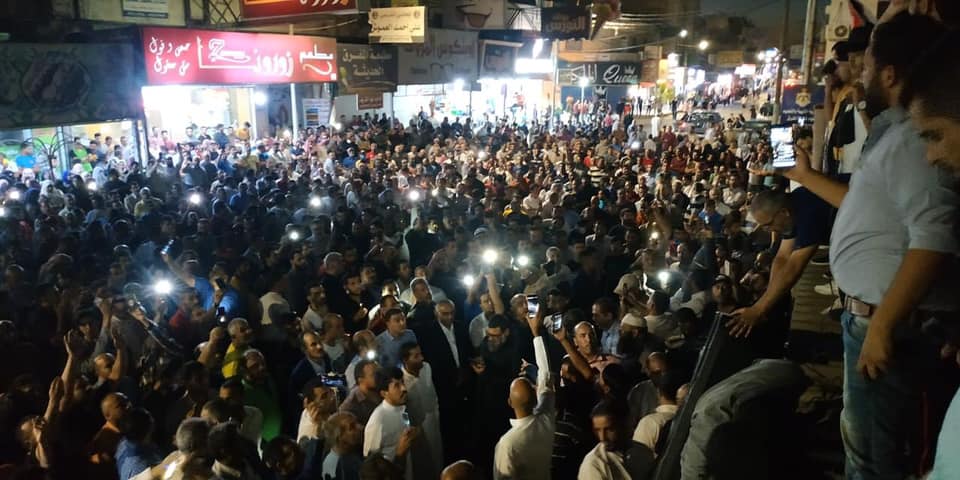Samidoun Palestinian Prisoner Solidarity Network expresses its strongest solidarity with the Teachers’ Syndicate of Jordan and its detained leadership. On 25 July, the Jordanian regime ordered the union shut down and its 13 managing council members arrested. The detained union leaders are currently on hunger strike in Jordanian prisons. We join the calls for their immediate release and the release of all political prisoners and detainees in Jordanian prisons and for the restoration of the legitimate Teachers’ Syndicate, representing the Jordanian teachers.
The attack on the union – in which the minister of education has now attempted to appoint a replacement committee to serve in place of the union, with no real representation for teachers – comes in response to teachers’ widespread protests, heavily supported for the public, for a minimum standard of living, after the Jordanian government froze all public sector wage increases. It also follows a four-week strike in September 2019 for a salary increase that had been promised – but never implemented – in 2014.
The Jordanian government extended the detained union leaders’ imprisonment without responding to their demands; however, people throughout Jordan have taken to the streets across the country to demand the release of the imprisoned union council and support the teachers’ demands. At the same time, the Jordanian state has attempted to block media reporting about the situation, including sharing social media content.
The widespread protests, especially the protests of the teachers themselves, have been met with harsh and violent police repression, targeting demonstrators with clubs and batons. The dissolution of the union violates Jordanian law as well as international conventions to which the Jordanian state is a signatory.

Beyond the legal violations, the attack on the teachers’ union in Jordan also reflects the ongoing war on the popular masses of Jordan by the monarchy, which has not only aimed to suppress labor organizing – long a stronghold of anti-normalization campaigns – but also all efforts to stand with the Palestinian people and the Palestinian resistance.
The Jordanian state is one of the premier reactionary regimes in the region, tightly aligned to U.S. imperialism and engaged in the Wadi’ Araba treaty with Israel, which came only one year after the Oslo agreement. Long before Wadi’ Araba, however, the Jordanian monarchy harshly repressed Palestinian organizations and resistance movements, a policy that continues in various forms until the present day. These policies have benefitted only the ruling classes and the capitalist elite, while the Jordanian and Palestinian working class and popular masses face ongoing attacks on their basic rights, including the right to organize and strike.
The Jordanian regime – much like several European states in a tight alliance with the U.S. and the Israeli settler colonial project – is engaged in a 15-year, $10-billion gas deal to purchase looted Palestinian gas from the Israeli occupation, against the wishes of the Jordanian public and even the parliament. Funds that could go to support Jordanian development and the well-being of the people – including Jordanian teachers – are instead going to subsidize Israeli colonization.
Youth activists and political leaders have been detained, arrested, imprisoned and threatened for protesting Jordanian involvement with other reactionary regimes in promoting the normalization of the Israeli regime or urging an independent path free of U.S. imperialism and British and European colonial powers.
Recently, the Jordanian State Security Court criminally convicted five young men, accusing them of attempting to carry out a Palestinian resistance action against Zionist forces in occupied Jerusalem and sentencing them to five years in prison – part of ongoing “security coordination” with the Israeli occupation under the pretext of “anti-terror” laws. Such “anti-terror” policies have nothing to do with protecting the interests or security of Jordanians or Palestinians, but only serve the interests of U.S. imperialism – a powerful backer of the Jordanian regime – and its strategic partner, the Israeli occupation.
These repressive systems are the same ones targeting Jordanian teachers and their unions, which has included accusations of “cyber-crimes” against union leaders for posting messages in opposition to the government and in support of their wage demands. Indeed, the Jordanian regime has attempted to take advantage of the COVID-19 crisis not to increase social solidarity but to confiscate workers’ rights, repress protests and engage in political arrests, putting the victims of repression at even greater risk amid the pandemic.
TAKE ACTION:
Samidoun Palestinian Prisoner Solidarity Network urges supporters of Palestine to stand with the Jordanian teachers. In particular, we urge labor unions, labor activists and workers’ organizations to stand with the union and urge the release of political prisoners in Jordan. Contact the Jordanian mission to the United Nations at missionun@jordanmissionun.com and send them the following message:
Dear Ambassador Sima Sami Bahous,
I write to express my strongest solidarity with the Jordanian teachers’ union and the rights of teachers in Jordan to organize and strike. I urge that the detained teachers’ union leaders be released immediately and that the Teachers’ Syndicate be restored to its proper and legal position representing the teachers of Jordan. Further, I urge the Jordanian government to end the crackdown on public expression, popular demonstrations, journalism and social media commentary. The actions taken violate both Jordanian law and Jordan’s obligations under the international treaties and covenants to which it is a signatory. Teachers and workers around the world stand with the teachers of Jordan in their demands for justice.
Regards,
YOUR NAME
Discover more from Samidoun: Palestinian Prisoner Solidarity Network
Subscribe to get the latest posts sent to your email.




